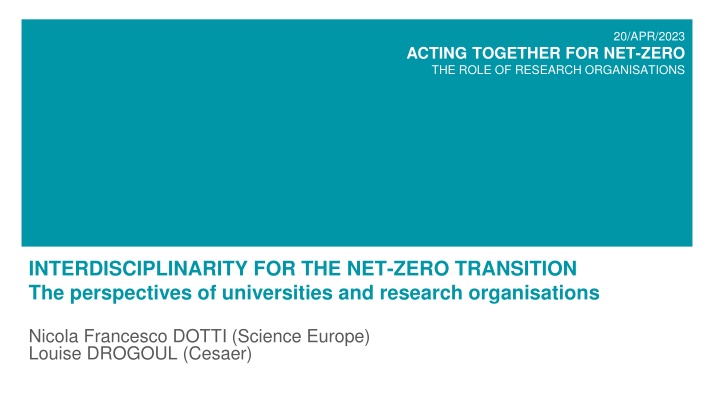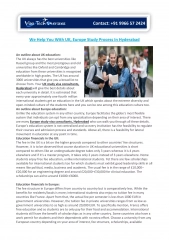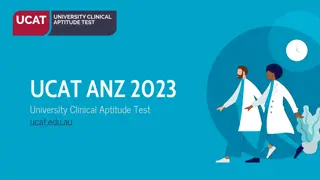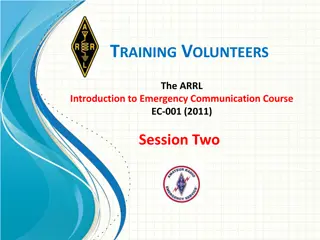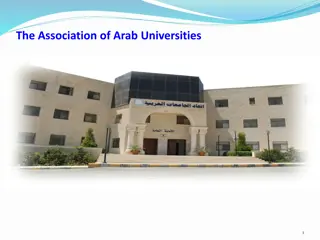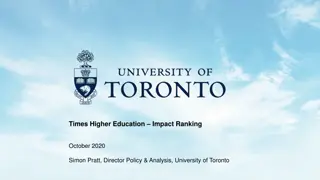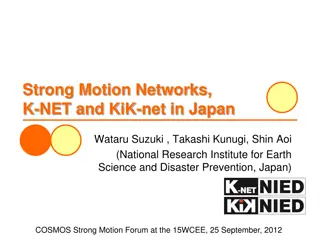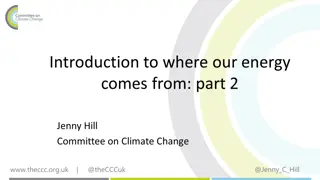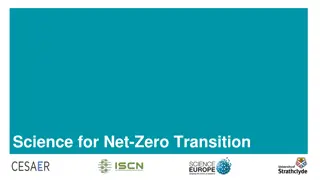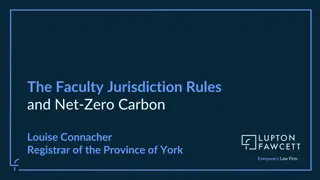Interdisciplinarity for the Net-Zero Transition: Perspectives of Universities and Research Organizations
In the pursuit of achieving a net-zero future, universities and research organizations are emphasizing the critical role of interdisciplinarity. Collaboration and innovation across various fields are key to accelerating the transition to a sustainable world with reduced emissions. This article delves into the importance of interdisciplinary approaches in tackling the climate crisis and highlights initiatives driving the Net-Zero Transition.
Download Presentation

Please find below an Image/Link to download the presentation.
The content on the website is provided AS IS for your information and personal use only. It may not be sold, licensed, or shared on other websites without obtaining consent from the author.If you encounter any issues during the download, it is possible that the publisher has removed the file from their server.
You are allowed to download the files provided on this website for personal or commercial use, subject to the condition that they are used lawfully. All files are the property of their respective owners.
The content on the website is provided AS IS for your information and personal use only. It may not be sold, licensed, or shared on other websites without obtaining consent from the author.
E N D
Presentation Transcript
20/APR/2023 ACTING TOGETHER FOR NET-ZERO THE ROLE OF RESEARCH ORGANISATIONS INTERDISCIPLINARITY FOR THE NET-ZERO TRANSITION The perspectives of universities and research organisations Nicola Francesco DOTTI (Science Europe) Louise DROGOUL (Cesaer)
OUTLINE BACKGROUND KEY MESSAGES 1. Interdisciplinarity 2. Lead by example 3. Students involvement 4. Science-Policy Interactions 5. Acting together CONCLUSIONS & NEXT STEPS
INTERDISCIPLINARITY FOR THE NET-ZERO TRANSITION The perspectives of universities and research organisations ACTING TOGETHER FOR THE NET-ZERO TRANSITION BACKGROUND
LOOKING BACK COP26 SYMPOSIUM [08/NOV/21] LAUNCH OF THE CALL TO ACTION ESOF2022 [15/JUL/22] SESSION ENGAGING RESEARCHERS COP27 LEAD-UP SYMPOSIUM [02/NOV/22] INTERDISCIPLINARITY FOR THE NET-ZERO TRANSITION TODAY S WEBINAR ACTING TOGETHER FOR NET-ZERO
THE CALL TO ACTION [ ] WE SHARE A VISION OF A WORLD WHERE RESEARCH AND EDUCATION COMMUNITIES WORK TOGETHER AND IN INTERACTION WITH INDUSTRY AND SOCIETY AT LARGE TO SOLVE URGENT GLOBAL CHALLENGES. [ ] [ ] WE ACKNOWLEDGE THAT ACTIONS WILL BE DEVELOPED BY EACH ORGANISATION ACCORDING TO THEIR DISTINCTIVE MISSIONS, VISIONS, AND PRIORITIES. [ ] WE INVITE OTHER ORGANISATIONS THAT SHARE OUR VISION TO COMMIT TO THESE ACTIONS AND WORK WITH US TOWARDS A SUSTAINABLE FUTURE WITH NET-ZERO EMISSIONS, JOINING US IN FUTURE COP MEETINGS TO ASSESS PROGRESS. I. Responding to the complexity of the net-zero challenges by addressing them in an interdisciplinary way II. Developing the next generation of students and researchers for the net-zero transition III. Reducing our own organisational carbon footprint IV. Supporting the net-zero transition in policymaking at all levels. V. Improving the shared understanding of what needs to be done. VI. Facing the challenges together. READ THE FULL TEXT HTTP://SCIEUR.ORG/COP26-CTA
INTERDISCIPLINARITY FOR THE NET-ZERO TRANSITION The perspectives of universities and research organisations INTERDISCIPLINARITY / LEADING BY EXAMPLE / STUDENTS INVOLVEMENT / SCIENCE-POLICY INTERACTIONS / ACTING TOGETHER KEY MESSAGES
1) INTERDISCIPLINARITY TO TACKLE THE CLIMATE CRISIS The institutional leaders support the importance of interdisciplinarity in research and teaching to promote the Net- Zero Transition. Many interdisciplinary initiatives exist, effectively tackling the climate crisis, but they need to be scaled up to accelerate the Net- Zero Transition. Research stakeholders organisations should provide visibility of good practices, facilitate knowledge exchange, and support at the organisational level.
2) LEADING BY EXAMPLE Universities, research funders and performers are already 'greening' their activities by reducing emissions. These experiences should be further promoted to lead by example , building trust among actors. Research organisations should motivate other sectors to speed up their transitions towards Net Zero.
3) INVOLVING STUDENTS AND NEXT GENERATION RESEARCHERS Students as a leading force for the Net-Zero Transition. Their involvement in interdisciplinary teaching and research activities brings positive change and should be further encouraged. Students are the future leaders, professionals, and experts: by embedding the values of the UN Sustainable Development Goals, they can be the future agents of change towards climate sustainability.
4) REINFORCE SCIENCE-POLICY INTERACTIONS Universities and research organisations should support policy for the Net-Zero Transition at all levels in a joint effort to tackle the climate crisis. Many examples of engaged local communities have proven to be effective. The direct involvement of researchers and students, supported by their organisations, can provide relevant impacts, even with limited funding. Interdisciplinary communities are the base for developing research projects, teaching programmes and other initiatives that can effectively contribute to the Net-Zero Transition.
5) ACTING TOGETHER Universities and research organisations are considered among the most neutral organisations. They have a privileged position to mobilise all other actors. The establishment of common platforms with universities, research organisations, governments, business sectors, and other societal stakeholders should be encouraged to tackle the climate crisis. Stakeholders engagement should be at the international and local levels to speed up the transition towards Net-Zero.
INTERDISCIPLINARITY FOR THE NET-ZERO TRANSITION The perspectives of universities and research organisations CONCLUSIONS
CONCLUSIONS & NEXT STEPS MOBILISE RESEARCH ORGANISATIONS DEVELOP GUIDANCE WITH CONCRETE STEPS FOR RESEARCH ORGANISATIONS PROMOTE AND SUPPORT THE SCALE UP OF EXISTING EXPERIENCES
THANKS FOR YOUR ATTENTION Louise DROGOUL Louise.Drogoul@Cesaer.org www.cesaer.org Nicola Francesco DOTTI Nicola.Dotti@scienceeurope.org www.scienceeurope.org
